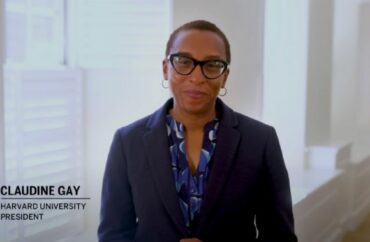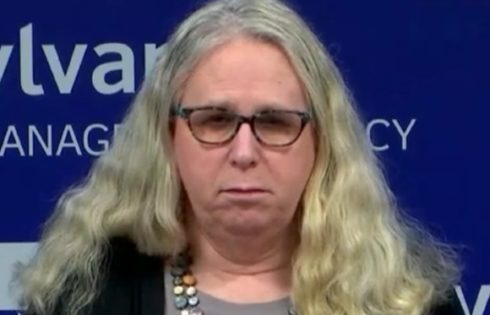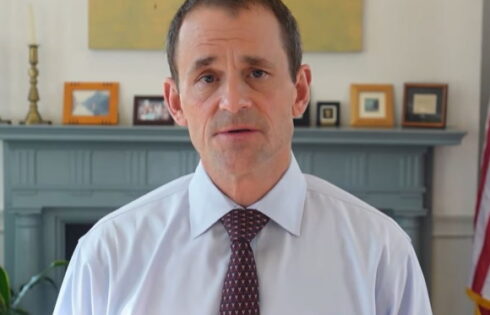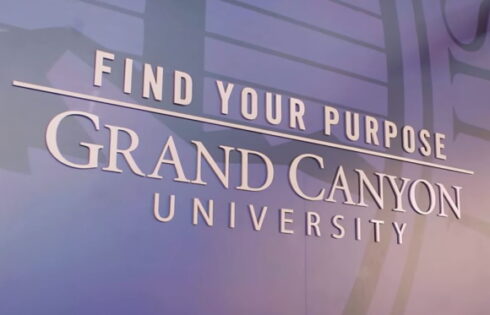
Are we supposed to believe Harvard factors diversity into everything *but* its presidential selection?
Harvard University President Claudine Gay was obviously a diversity hire.
Billionaire Bill Ackman, a vocal critic of his alma mater, said he confirmed with “multiple sources,” that the presidential search committee “excluded non-DEI eligible candidates from the process.”
The news comes at the same time Gay (pictured) is facing dozens of accusations for plagiarism and is under fire for her response to antisemitism on campus.
But even without Ackman’s memo, simple logic should show that Harvard University would select someone based on their identity, not on their scholarship and ability to lead a major institution. Gay is probably a nice and intelligent person. That does not mean she was the best choice for the job.
The Ivy League university factors diversity into every “facet” of its life – it would not make sense it would do so except in the selection of its leader.
“Our diversity has enriched every facet of the work that we do at Harvard, and will continue to strengthen our community in the years to come,” Provost Alan Garber states on the university website.
“Together, we strive to create an environment that values diversity, promotes an inclusive culture, and establishes a profound sense of belonging for each member of our community,” the university states on its diversity page.
Its job postings reflect its commitment to factor identity into hiring. A job posting for a theoretic quantum science professor position says the university “strongly welcome[s] applications from persons from underrepresented groups.”
The School of Engineering and Applied Sciences “is dedicated to building a diverse and welcoming community, and we strongly encourage applications from historically underrepresented groups.” This is from a job posting for a postdoctoral fellow in atmospheric science engineering.
The Crimson, Harvard’s student newspaper, saw Gay as a diversity hire.
“The momentousness of her very appointment feels as though it heralds the start of a more progressive era at Harvard,” the editorial board wrote. This new era is “one that understands representation, diversity, and inclusion as essential to creating the kind of vibrant intellectual community that can in turn create a better world.”
Harvard’s student newspaper has also covered how “diversity” (i.e. being a black woman), would factor into the presidential search process. “Former Harvard administrators and higher education experts expect a consideration of candidate diversity to feature in the search, but not as a determinative factor,” The Crimson reported in September 2022 in an article about the search process.
The paper then quoted former Harvard Provost Harvey Fineberg who “wrote that he anticipates the search committee ‘will likely be attentive’ to candidates from underrepresented backgrounds.”
“[T]he committee will not be making any ‘symbolic social statement’ with its decision: it will seek the best candidate for the job, and that person’s sex, race or ethnicity will be whatever it is,” the former provost told The Crimson.
Those two statements are in tension.
Diversity cannot be a “feature” without serving as a determining factor. It is true Harvard, if forced to choose between a racial minority without a high school diploma and a white man with a doctorate, would probably choose the latter.
But if it came down to a black woman with degrees from elite universities and a white man with degrees from the same institutions, everything points to Harvard selecting the former.
MORE: Diversity statements used to cull applicant pool
Which leads to another piece of evidence that Gay was a diversity hire – her lack of academic prowess.
The same December 2022 editorial that praised Gay also addressed the idea that she, and other racial minorities “are dismissed as diversity hires.”
“Gay has already received criticisms of the former variety for an alleged lack of academic merit and administrative experience,” The Crimson editorial board wrote. “These denouncements are categorically untrue.”
It then went on to list her degrees from Stanford and Harvard, as well as various prizes she won for academic papers. (She won a prize for her doctoral thesis, which included plagiarized portions).
It is true she won awards for her academic work as a student. Uncle Rico might have been a great high school football player, too. What matters in academia is what you do after graduating.
Evolutionary biologist Colin Wright has pointed out Gay’s “h-index (a widely used metric that measures a scholar’s productivity and impact) is 10.” (Her predecessor Lawrence Bacow has an h-index of 13 but has been cited more than 2,500 times. Gay has been cited only 171 times).
Purely academic achievements are not enough to be a university president – soft skills like negotiation and communication are also important. But Gay, who graduated with her doctorate from Harvard in 1998, is clearly not a scholar.
The h-index “captures research output based on the total number of publications and the total number of citations to those works, providing a focused snapshot of an individual’s research performance,” according to the University of Waterloo.
By comparison, professors in political science at less prestigious universities have higher scores than Gay. One professor at nearby Northeastern University, who only obtained her doctorate in 2017, has an h-index of 16.
Another political science professor at University of Massachusetts-Boston, who received her doctorate in 2003, has an h-index of 12.
Harvard is now paying the price for its decision to place diversity above merit.
MORE: Ohio State University prioritized DEI over merit in hiring
IMAGE: Harvard University/YouTube
Like The College Fix on Facebook / Follow us on Twitter







Please join the conversation about our stories on Facebook, Twitter, Instagram, Reddit, MeWe, Rumble, Gab, Minds and Gettr.